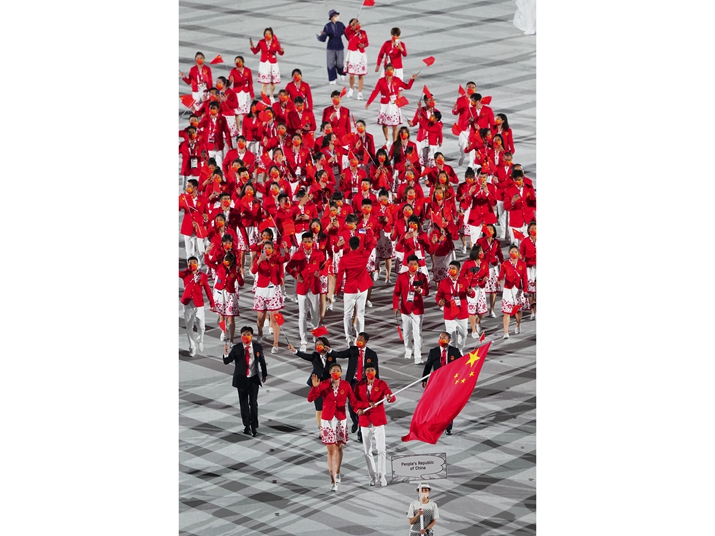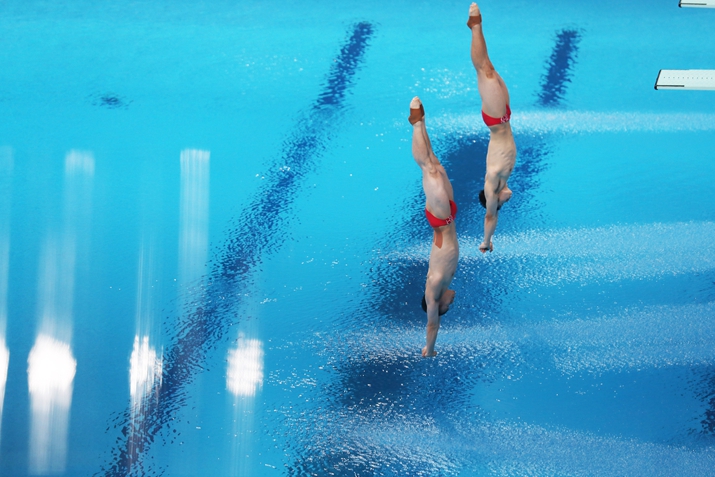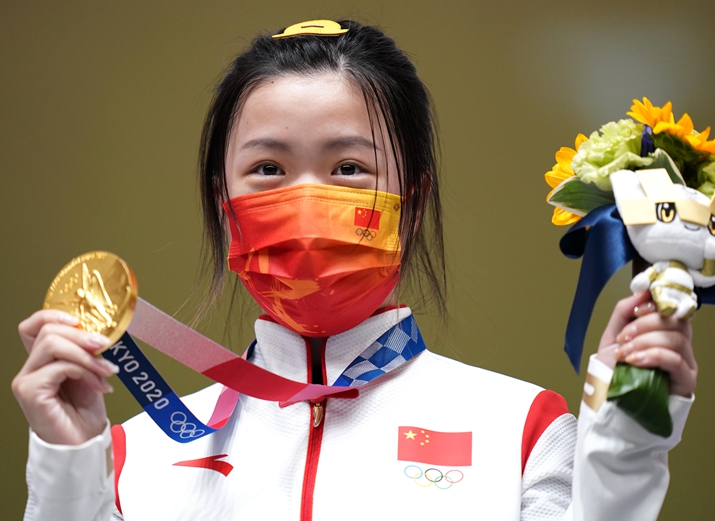| Top 10 World News Stories |
| Olympic Games Tokyo 2020 | |
| As the COVID-19 pandemic continues, the Tokyo Olympic Games Organizing Committee and all the sectors of Japanese society, with the support of the IOC and the rest of the world, have overcome many obstacles to prepare a wonderful stage for all the athletes to realize their Olympic dreams | |
|
|
 (Left) Chinese fencer Sun Yiwen (left) in competition in Tokyo, Japan, on July 24 Members of the Chinese delegation parade into the Olympic Stadium during the opening ceremony of the Olympic Summer Games Tokyo 2020 in Japan on July 23 (XINHUA)
Yang Qian, 21, gained her fame for being so poised and collected for her age. On July 24, the Chinese shooter won the first gold medal of the Olympic Summer Games Tokyo 2020 with a victory in the women's 10-meter air rifle, followed by Anastasiia Galashina of Russia who took the silver and Nina Christen of Switzerland who bagged the bronze. "I wasn't as composed as I seemed. During the qualification and the final I kept adjusting my mentality, trying to shake the pressure off me, and I think I did well in doing so," Yang said after winning the honor. "I am very happy and proud to win this gold." Yang made a good start for the long-awaited Olympic Summer Games, taking place between July 23 and August 8. As the first held after the outbreak of COVID-19, the ongoing games are unusual, for an absence of a big audience due to pandemic control measures, and also for having a new motto. On June 20, the 138th Session of the Interna-tional Olympic Committee (IOC) approved a change in the Olympic motto to recognize the unifying power of sports and the importance of solidarity. The new Olympic motto now reads: "Faster, Higher, Stronger—Together." By adding the world "together" to the previous motto, IOC President Thomas Bach said, "We want to put a strong focus on solidarity." In a world ravaged by the pandemic, solidarity appears to be more precious. The Olympic Games is capable of "getting the entire world together in one peaceful competition, to have athletes in one country, in one city, in one Olympic village, competing against each other but living together because they are under the same rules," Bach said at a recent press conference.  Chinese divers Xie Siyi and Wang Zongyuan compete in men's synchronized 3-meter springboard final on July 28 (XINHUA)
New look China has dispatched a 777-member delegation to Tokyo, its largest ever participation in an overseas Olympics. The 431 Chinese athletes, including 24 Olympic champions, are competing in 30 out of 33 sports in Tokyo. Yang gained a lot of attention not only because she is the first gold medalist, but also a junior at Tsinghua University, one of the most prestigious universities in China. Netizens applauded her as having both brain and muscle. After being scouted by a junior school sports coach, Yang started her life of shooting when she was in fourth grade in primary school. Talent, a calm personality and support from coaches, family and many others have brought her to the medals podium in Tokyo this year. After winning another Olympic gold on July 27, Yang expressed her gratitude for all supporting her, "Thank you all for your support! I will continue to work hard." Similar to Yang, several other members of the Chinese delegation have both high athletic and academic qualifications. For example, 19-year-old shooter Shi Mengyao and 30-year-old jumper Wang Yu are school fellows of Yang; women's basketball team captain Shao Ting is a PhD candidate in education and a multiple scholarship receiver; sprinter Su Bingtian is currently an associate professor at the School of Physical Education at Jinan University in Guangzhou, Guangdong Province. "After knowing their background, I was inspired and I hope one day I could be like one of them and manage my schoolwork and career well and bring honor to the country," Lu Shaojia, a 14-year-old student from Zhuzhou, Hunan Province, who takes part in track and field after-school training, told Beijing Review.  Chinese fencer Sun Yiwen (left) in competition on July 24 (XINHUA)
New tech Tokyo Olympics greets the world audience with its hi-tech features. One example is Miraitowa, a robot mascot that can be seen at games venues and other games-related locations welcoming athletes and guests with human-like movements. A camera has been placed on Miraitowa's head so that it can recognize people nearby. It can then read expressions on faces and react to them. The two eyes of Miraitowa are screens, which can show emotions such as happiness. Other robots with various functions are also on display in the Olympic Village. They can perform cleaning duties, provide multilingual guides, serve as guards and do other things. They can also do heavy tasks such as carrying luggage, delivering other things, picking up garbage, providing emergency support, and patrolling to maintain public order at the venues. Innovative solutions have also been used to allow fans in front of the screen around the world to connect with the athletes. For example, a tool on the digital services of some broadcasters can allow fans at home to press a button to cheer athletes and express their excitement. The sound of previous Olympic events is also added to bring some atmosphere to the empty stadiums. According to NHK of Japan, an artificial intelligence (AI)-powered scoring assistance system has been introduced in gymnastics events to track athletes' movements by projecting infrared rays onto the body and its surroundings, and converting them into a real-time three-dimensional image. Based on the images, AI analyzes the body's rotation, twisting and other movements, combined with past performance data to judge the completion of athletes' performance based on the scoring standard. In track and field competitions, a three-dimensional tracking technology is applied. In this way, a colored track appears behind the athletes on the screen, showing speeds of athletes at different spots on the track.  Chinese athlete Yang Qian poses during the award ceremony after the Tokyo 2020 women's 10-meter air rifle final in Tokyo, Japan, on July 24 (XINHUA)
Also, according to Bach, due to the pandemic, the Tokyo Olympics will use cloud technology to support global broadcasting for the first time, becoming a true "Olympic in the Clouds." Most competition venues impose strict restrictions on the number of spectators entering the stadium, with competitions held without a large audience. To this end, a cloud broadcast platform is used to complete functions such as event broadcasting and content distribution. Alibaba Group became the IOC's official Cloud Services and E-Commerce Platform partner in 2017 and the partnership will run to 2028. Facial recognition technology is used at venues for security screening of athletes, staff members, volunteers, media and others, speeding up the entire process and giving better security results. It is also a first for the Olympics. "We have seen the great efforts made by Japan to provide all the services to different delegations. Coaches and the staff of the Chinese delegation have felt the warmth and friendliness of the organizing committee's staff and volunteers," said Liu Guoyong, Secretary General of the Chinese delegation. As the COVID-19 pandemic continues, the Tokyo Olympic Games Organizing Committee and all the sectors of Japanese society, with the support of the IOC and the rest of the world, have overcome many obstacles to prepare a wonderful stage for all the athletes to realize their Olympic dreams, Liu said. (Print Edition Title: Motion and Emotion) Copyedited by Ryan Perkins Comment to luyan@bjreview.com |
|
||||||||||||||||||||||||||||||
|